The Man Who Shot an Elephant in His Pajamas: A Deep Dive into the Best Groucho Marx Quotes

Before memes, before Twitter, before the internet turned every wisecrack into a viral sensation, there was a man with a greasepaint mustache, a perpetually wagging cigar, and a wit so fast it could break the sound barrier. His name was Groucho Marx, and he was the undisputed king of the one-liner, the master of the non-sequitur, and the patron saint of anyone who has ever looked at the absurdities of life and decided to laugh. To explore the world of Groucho Marx Quotes is to take a delightful tumble down a rabbit hole of illogical logic and perfectly aimed insults. These aren’t just jokes; they are tiny, explosive masterpieces of language. This is more than a list of his greatest hits; it’s an attempt to dissect the brilliant, anarchic mind of the man who gave us some of the most enduring and famous Groucho Marx sayings ever uttered.
The Art of the Absurd: Deconstructing Groucho’s Illogical Logic
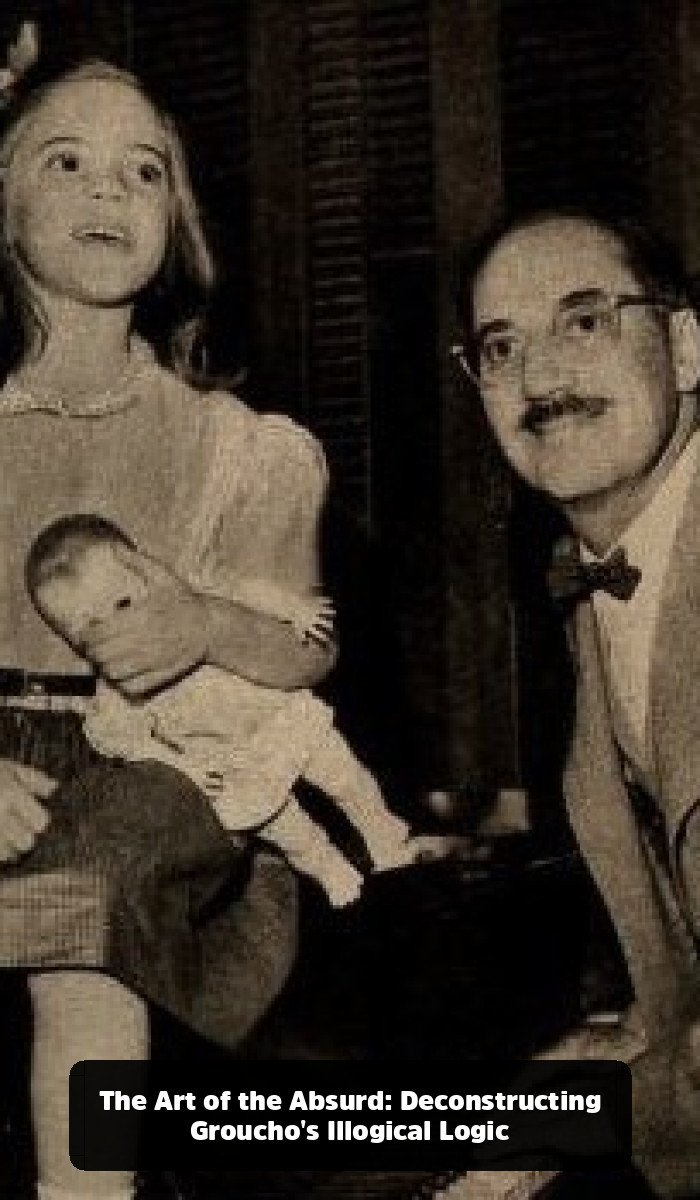
The true genius of Groucho Marx wasn’t just in his insults or his cynical observations; it was in his complete and utter mastery of bending language and logic until they snapped. He took ordinary sentences and gave them a surrealist twist, leaving his audience both confused and convulsed with laughter. These quotes by Groucho Marx are not just funny; they are miniature masterclasses in comedic structure.
“One morning I shot an elephant in my pajamas. How he got in my pajamas I’ll never know.”
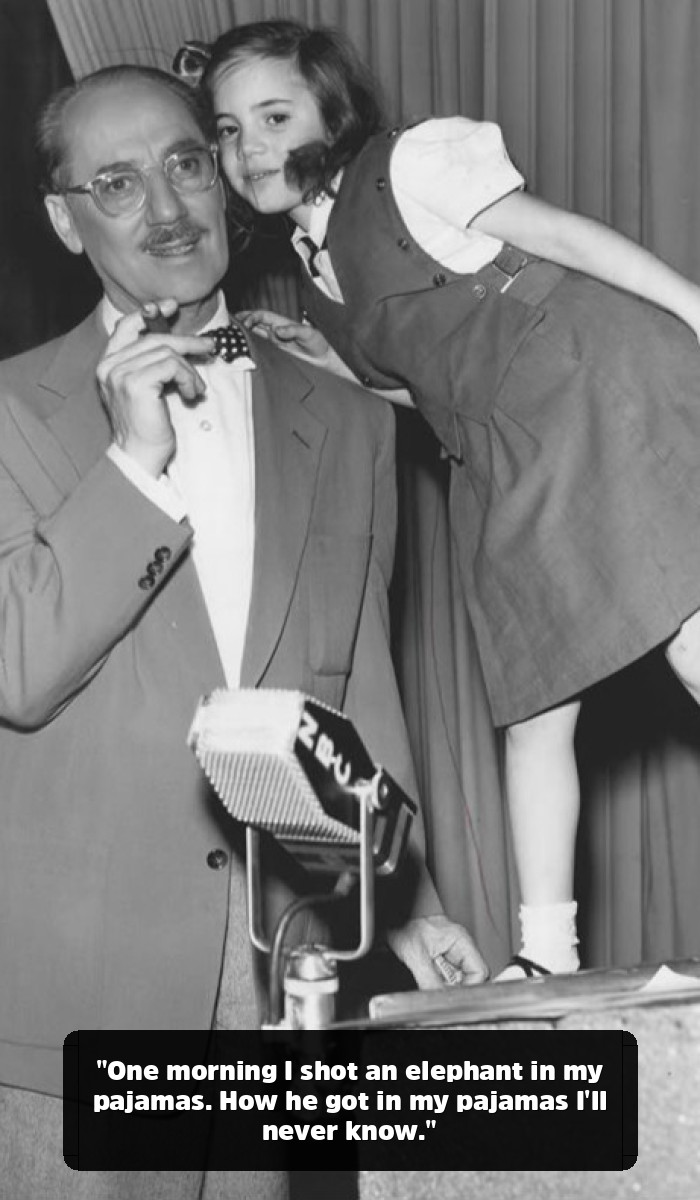
This is, quite possibly, the most perfectly constructed joke in the English language. It’s a masterwork of grammatical misdirection. The first sentence creates a mental image: Captain Spaulding (Groucho’s character in Animal Crackers) is wearing his pajamas and, for some absurd reason, shoots an elephant.
The comedy comes from the second sentence, which completely demolishes that image by reinterpreting the grammar. The phrase “in my pajamas” is a dangling modifier—it’s unclear whether it modifies the shooter or the elephant. Our brains naturally assume the former. Groucho brilliantly exploits this ambiguity for the punchline, creating the even more ludicrous image of an elephant somehow squeezing into his sleepwear. It’s a joke that weaponizes syntax. It’s not just a silly line; it’s a testament to a comedic mind that saw the hidden trapdoors in everyday language. Many of the best Groucho Marx quotes operate on this principle of playful linguistic sabotage.
“Time flies like an arrow. Fruit flies like a banana.”
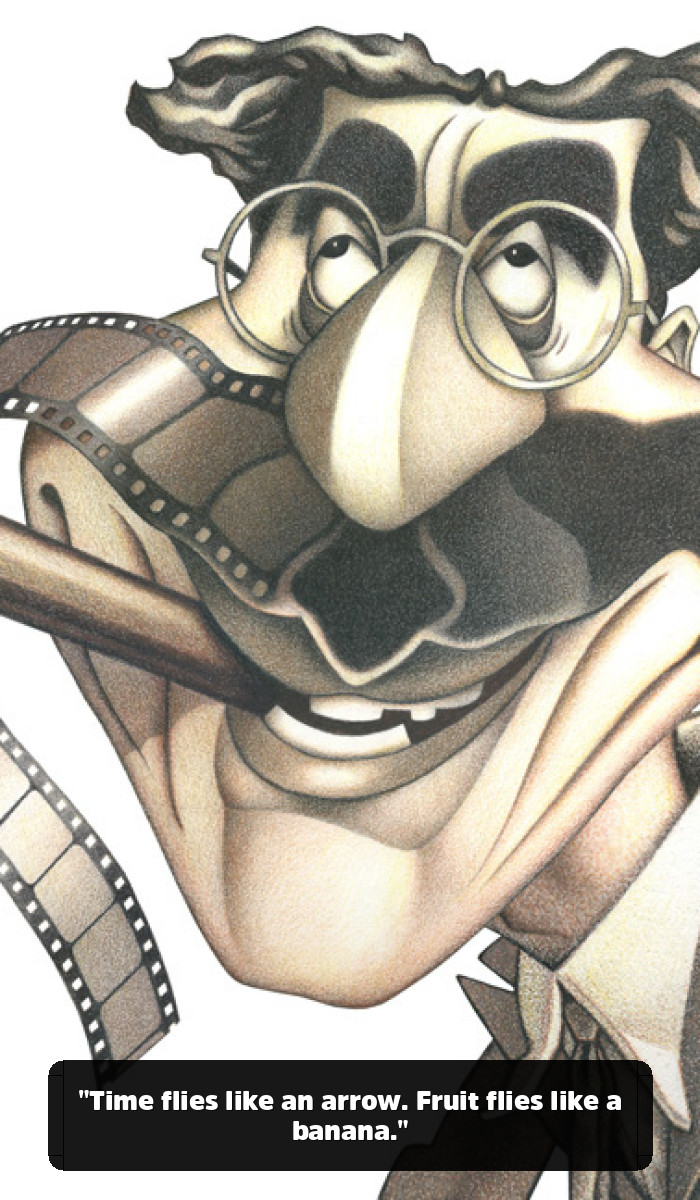
Here we have another example of Groucho’s genius for exploiting grammatical ambiguity. This is a type of pun known as an antanaclasis, where a single word or phrase is used in two different ways.
- “Time flies like an arrow”: This is a simple, straightforward simile. “Flies” is a verb, and “like” is a preposition. We understand it to mean that time passes quickly.
- “Fruit flies like a banana”: The structure of the sentence is identical, but the meaning of the words is completely different. “Fruit flies” is a noun (the insect), and “like” is now a verb (to enjoy).
The humor comes from the sudden, jarring shift in meaning. The first sentence sets up a philosophical, poetic expectation. The second sentence crashes the party with a completely mundane and silly observation. It’s a joke that plays on our brain’s pattern-recognition software and then gleefully corrupts the file. This is a hallmark of Groucho’s words of wisdom—taking something that sounds profound and revealing its absurd underbelly.
“Outside of a dog, a book is man’s best friend. Inside of a dog it’s too dark to read.”
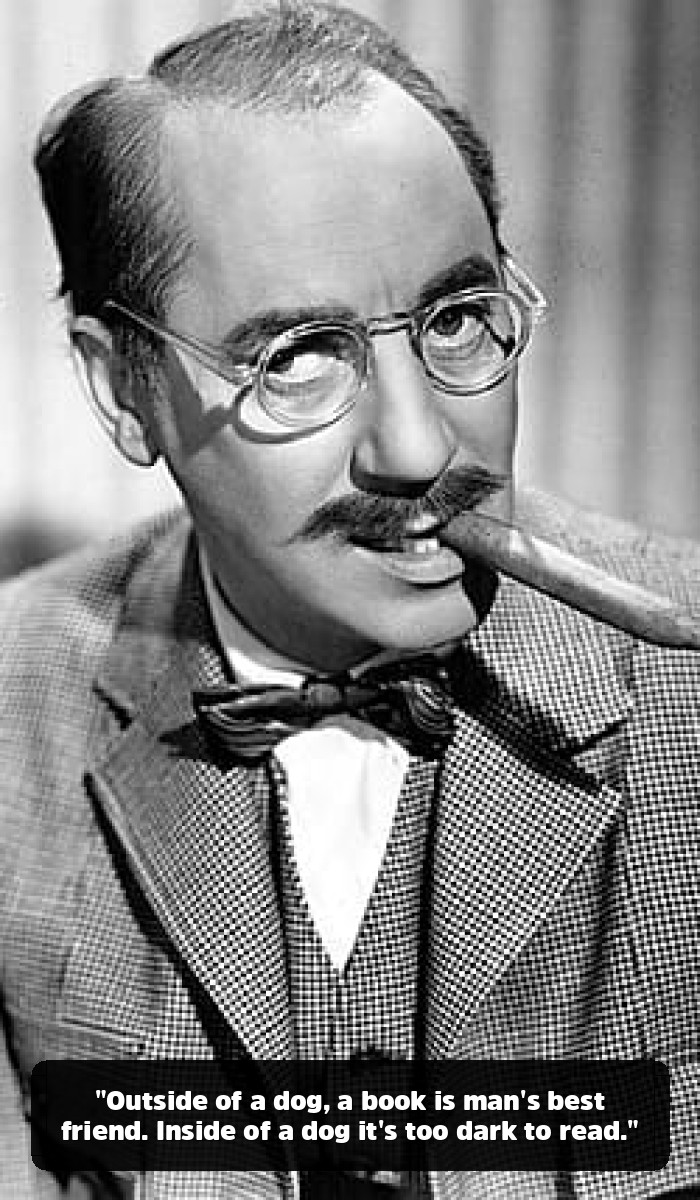
This is Groucho’s take on the classic proverb, and it is a masterpiece of taking a metaphor literally. The phrase “outside of” is meant to mean “with the exception of.” Groucho, with his relentlessly literal mind, chooses to interpret it as a physical location.
The joke sets up a warm, familiar sentiment: books are wonderful companions. Then, it yanks the rug out from under you with a completely practical, and hilariously grim, reason why the proverb is constructed the way it is. It creates a bizarre mental image that is impossible to shake. This technique—treating a figure of speech as a statement of fact—is a recurring theme in the vast collection of Groucho Marx quotes. He loved to find the literal in the figurative, the absurd in the commonplace.
The Cynic’s Guide to Life: Quotes on Honesty, Politics, and Success
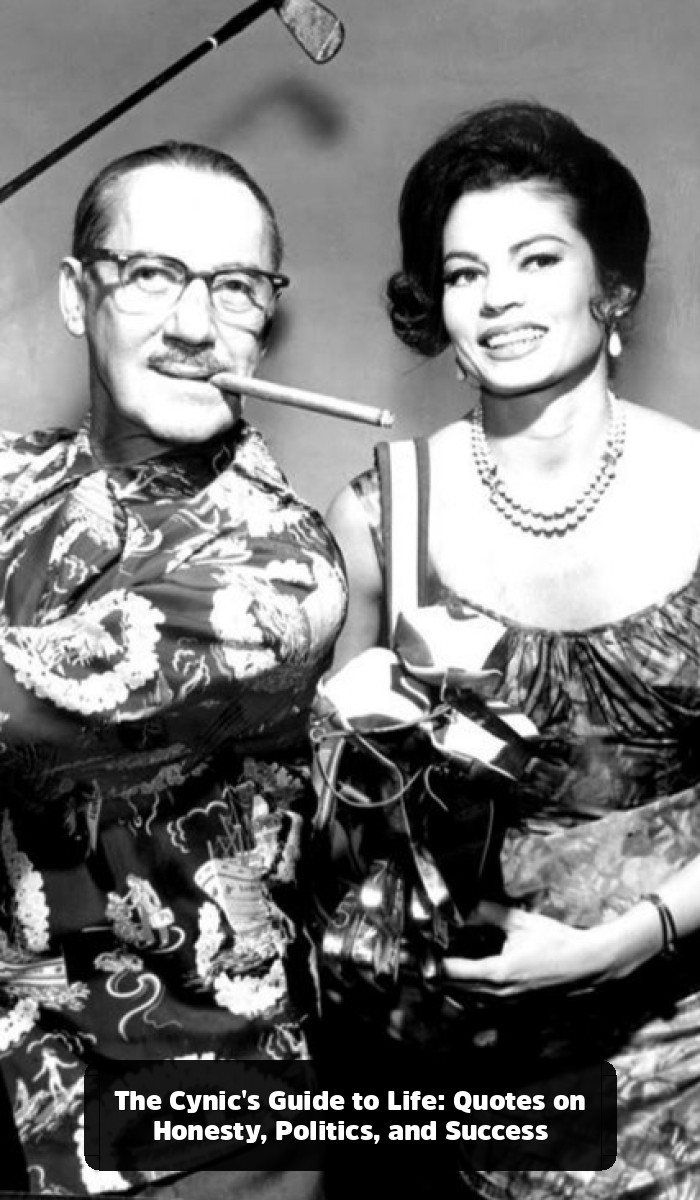
Beneath the vaudevillian silliness and the rapid-fire puns was a deeply cynical observer of human nature. Groucho had a sharp, unsentimental view of the world, and he wasn’t afraid to share it. He saw the phoniness in social conventions and the foolishness in our most cherished institutions. These famous Groucho Marx sayings are a perfect dose of reality, served with a twist of lemon and a cigar.
“The secret of life is honesty and fair dealing. If you can fake that, you’ve got it made.”
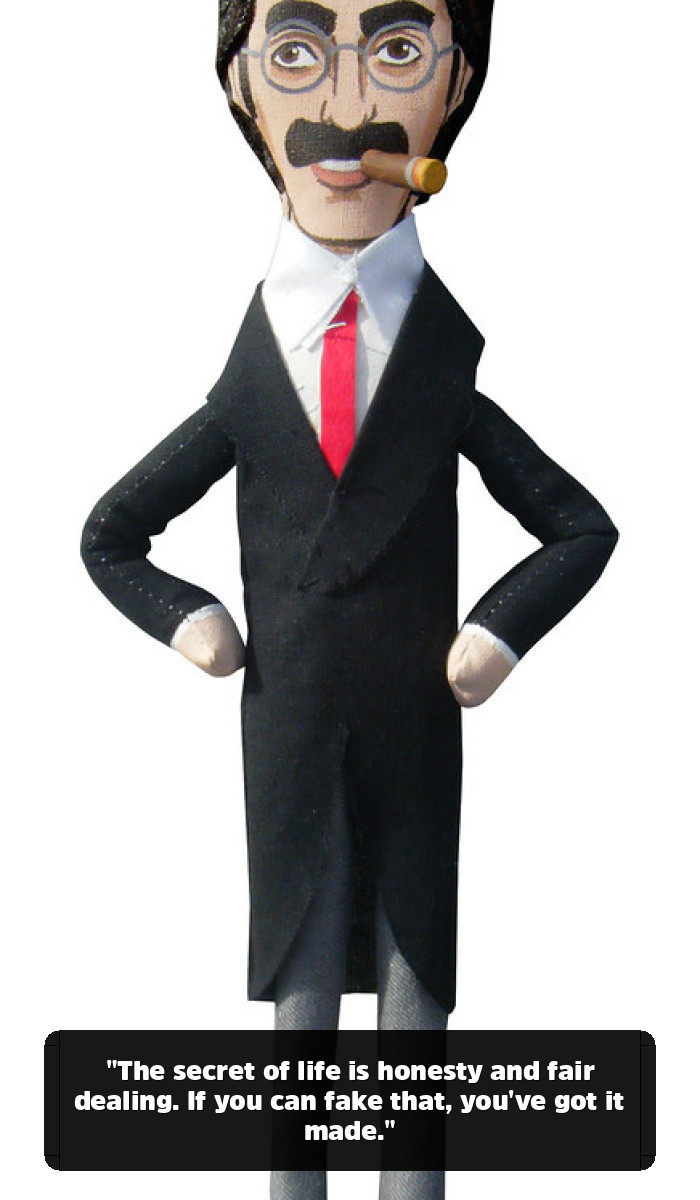
This is the ultimate cynical take on the importance of appearances. The quote starts out sounding like a piece of sincere, grandfatherly advice. It lulls you into a sense of moral comfort. Then, the second half delivers the punchline, which completely inverts the meaning of the first. The “secret” isn’t actually being honest; it’s being a convincing enough actor to seem honest.
It’s a hilarious and somewhat depressing commentary on the nature of success in a superficial world. It suggests that perception is more important than reality, and that the ability to project an image of virtue is more valuable than virtue itself. Coming from a man who spent his life in show business, a world built on illusion, this is one of the quotes by Groucho Marx that feels like it was learned the hard way.
“Politics is the art of looking for trouble, finding it everywhere, diagnosing it incorrectly and applying the wrong remedies.”

Has there ever been a more succinct and accurate description of the political process? This quote is a complete, four-act tragedy of governmental incompetence, delivered in a single sentence. Groucho breaks it down like a clinical diagnosis of a chronic disease:
- “Looking for trouble”: The creation or exaggeration of crises to justify action.
- “Finding it everywhere”: The tendency to see every problem as a nail for your particular political hammer.
- “Diagnosing it incorrectly”: The failure to understand the root causes of a problem due to ideology or ignorance.
- “Applying the wrong remedies”: The inevitable result of the first three steps—solutions that either don’t work or make the problem worse.
This is not just a joke; it is a razor-sharp piece of political analysis that feels as relevant in the 21st century as it did in the 20th. It’s one of the most enduringly popular Groucho Marx quotes because the subject matter, sadly, never seems to change.
“Those are my principles, and if you don’t like them…well I have others.”
This is the perfect punchline for the age of political expediency. It’s a hilarious admission of complete and utter moral flexibility. The speaker presents himself as a man of firm conviction, only to reveal in the same breath that his convictions are entirely negotiable.
This quote is a brilliant jab at anyone whose principles shift with the prevailing winds. It skewers the hypocrisy of those who talk a big game about their unshakeable beliefs but are willing to abandon them the moment they become inconvenient. It’s a timeless critique of opportunism, and it has become a go-to line for describing a certain kind of politician. This is one of the Groucho’s witty remarks that has embedded itself deep in our cultural lexicon.
The Groucho Gauntlet: 30 One-Liners to Keep in Your Back Pocket
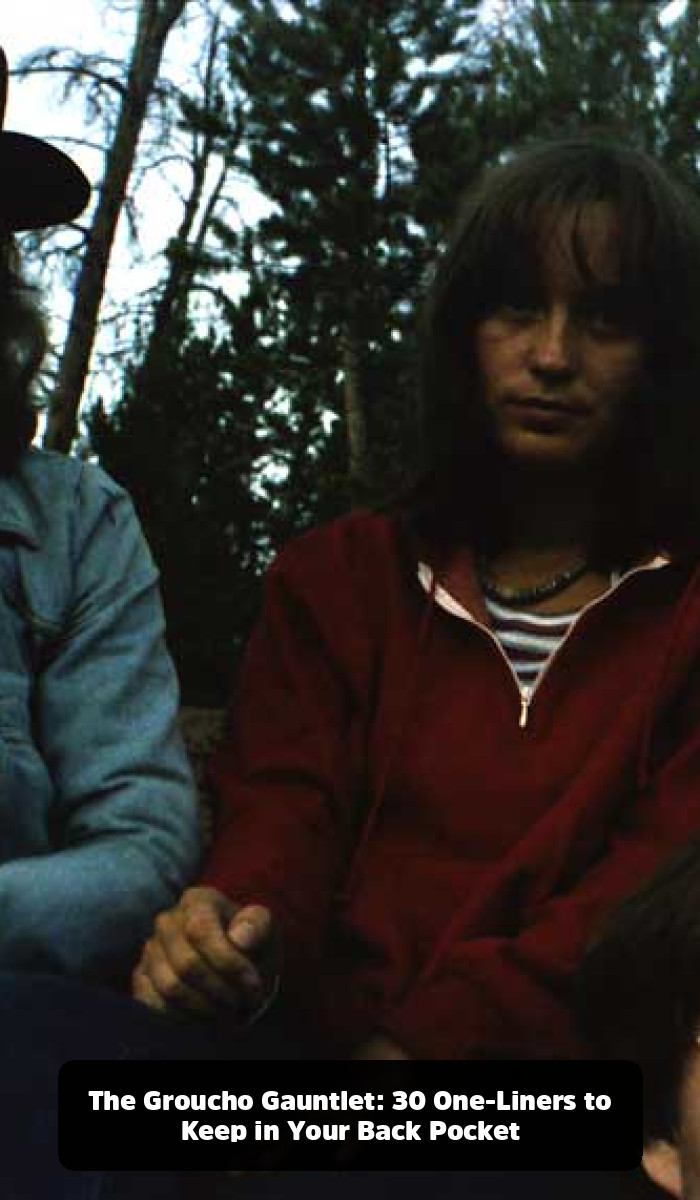
To truly appreciate the speed and brilliance of his mind, sometimes you just need the raw material. Here is a rapid-fire list of some of the best Groucho Marx quotes. As per our special instructions for this list, these gems are presented without commentary, like a string of firecrackers.
- I’ve had a perfectly wonderful evening, but this wasn’t it.
- I never forget a face, but in your case I’ll be glad to make an exception.
- From the moment I picked up your book until I put it down, I was convulsed with laughter. Some day I intend reading it.
- He may look like an idiot and talk like an idiot but don’t let that fool you. He really is an idiot.
- I was married by a judge. I should have asked for a jury.
- Humor is reason gone mad.
- Learn from the mistakes of others. You can never live long enough to make them all yourself.
- If a black cat crosses your path, it signifies that the animal is going somewhere.
- Blessed are the cracked, for they shall let in the light.
- While money can’t buy happiness, it certainly lets you choose your own form of misery.
- I intend to live forever, or die trying.
- A child of five could understand this. Send someone to fetch a child of five.
- Whatever it is, I’m against it.
- She got her looks from her father. He’s a plastic surgeon.
- Military intelligence is a contradiction in terms.
- Marriage is a wonderful institution…but who wants to live in an institution?
- A hospital bed is a parked taxi with the meter running.
- There’s one way to find out if a man is honest – ask him. If he says “yes” you know he is a crook.
- No one is completely unhappy at the failure of his best friend.
- If you find it hard to laugh at yourself, I would be happy to do it for you.
- Man does not control his own fate. The women in his life do that for him.
- Money frees you from doing things you dislike. Since I dislike doing nearly everything, money is handy.
- I find television very educating. Every time somebody turns on the set, I go into the other room and read a book.
- I’m not crazy about reality, but it’s still the only place to get a decent meal.
- I have nothing but respect for you — and not much of that.
- Anyone who says he can see through women is missing a lot.
- Only one man in a thousand is a leader of men — the other 999 follow women.
- I could dance with you till the cows come home. Better still, I’ll dance with the cows and you come home.
- Why, look at me. I’ve worked my way up from nothing to a state of extreme poverty.
- I am free of all prejudices. I hate everyone equally.
The Reluctant Member: Quotes on Clubs, Society, and Not Belonging
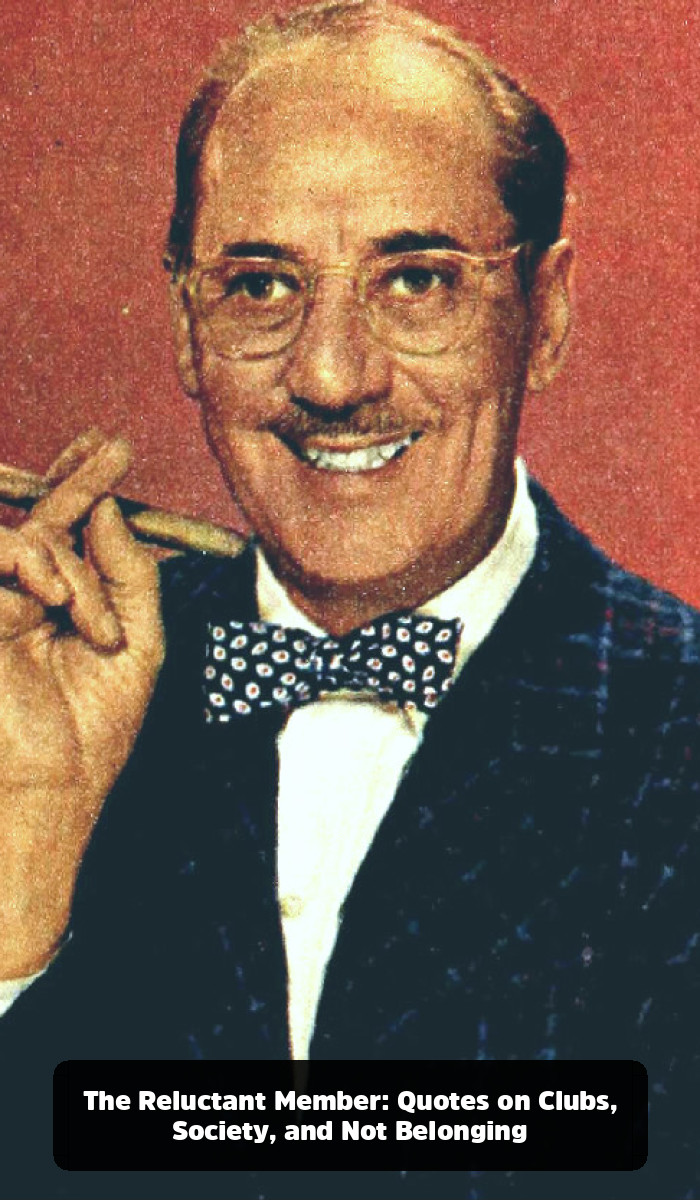
One of the central paradoxes of Groucho Marx is that he became a beloved insider by perfecting the art of being an outsider. He hobnobbed with movie stars, intellectuals, and presidents, all while lobbing comedic grenades at the very idea of high society and exclusive institutions. Groucho Marx Quotes are often the voice of the eternal contrarian.
“I DON’T WANT TO BELONG TO ANY CLUB THAT WILL ACCEPT ME AS A MEMBER.”
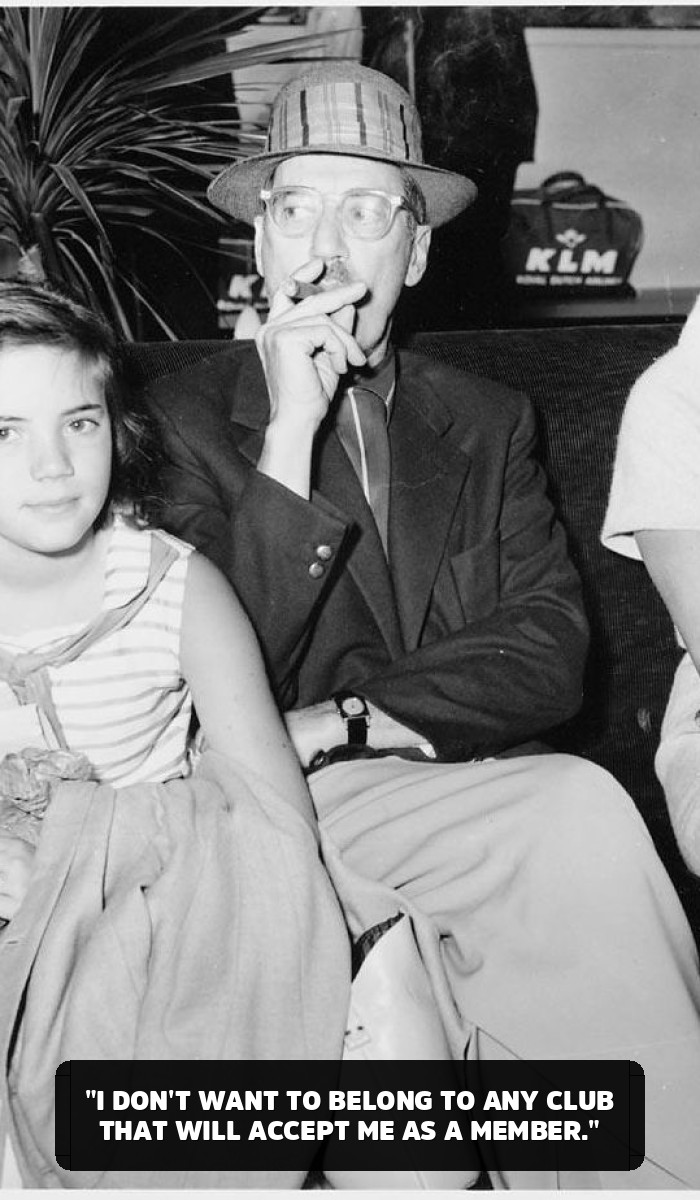
This is, without a doubt, the most famous of all his sayings on the topic of belonging. The line, which he famously sent in a telegram to the Friars Club of Beverly Hills, is a perfect, self-negating loop of logic. It’s a statement of such profound and hilarious self-deprecation that it circles all the way back around to being a form of supreme confidence.
The joke works on two levels. On the surface, it’s a classic self-insult: “If a club is desperate enough to have someone like me, then it can’t be a very good club.” But on a deeper level, it’s a radical declaration of independence. It’s a rejection of external validation. Groucho is saying that he refuses to define his self-worth by whether or not he is accepted by any group. It’s the ultimate anti-joiner’s anthem, and it perfectly encapsulates his persona as the wisecracking outsider who is somehow always at the center of the party. The popularity of this particular gem from the library of Groucho Marx Quotes is a testament to its brilliant, paradoxical logic.
“I’ve had a perfectly wonderful evening, but this wasn’t it.”
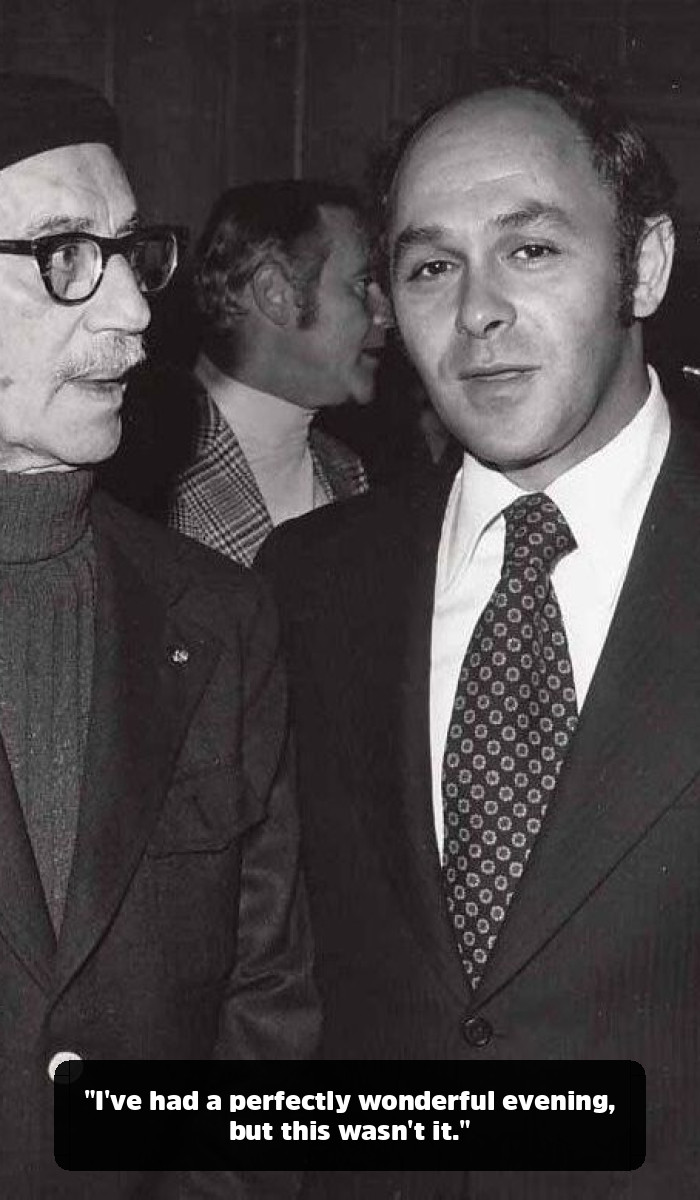
This is the polite insult elevated to an art form. It’s a masterclass in passive aggression, a way to express profound disappointment without ever raising your voice. The first clause, “I’ve had a perfectly wonderful evening,” is the setup. It’s the social lubricant, the thing you’re supposed to say when leaving a party. The second clause, “but this wasn’t it,” is the devastating punchline.
It’s a quote that perfectly captures the feeling of being trapped at a dull social gathering. It’s the silent scream of every introvert at a cocktail party. What makes it so brilliant is its veneer of politeness. It’s an insult wrapped in the language of a compliment, which makes it all the more cutting. This is one of the most useful one-liners of Groucho Marx for anyone who has ever needed a witty, if risky, exit line.
“Whatever it is, I’m against it.”

This line, from the song “I’m Against It” in the film Horse Feathers, is the purest expression of the contrarian spirit ever put to music. In the movie, Groucho plays Professor Quincy Adams Wagstaff, the new president of Huxley College, and he sings this anthem to a group of stuffy, traditionalist professors.
The song is a celebration of rebellion for its own sake. It doesn’t matter what the issue is; Wagstaff’s default position is opposition. It’s a hilarious send-up of both knee-jerk radicalism and the stubbornness of authority. The quote has since become a shorthand for anyone who defines themselves by what they are against, rather than what they are for. It’s a perfect summary of Groucho’s anarchic persona—a force of chaos sent to disrupt the orderly, self-satisfied world of the establishment. The film catalog of the Marx Brothers is a rich source for some of the best Groucho Marx quotes.
The Insult Comic-in-Chief: A Masterclass in the Put-Down
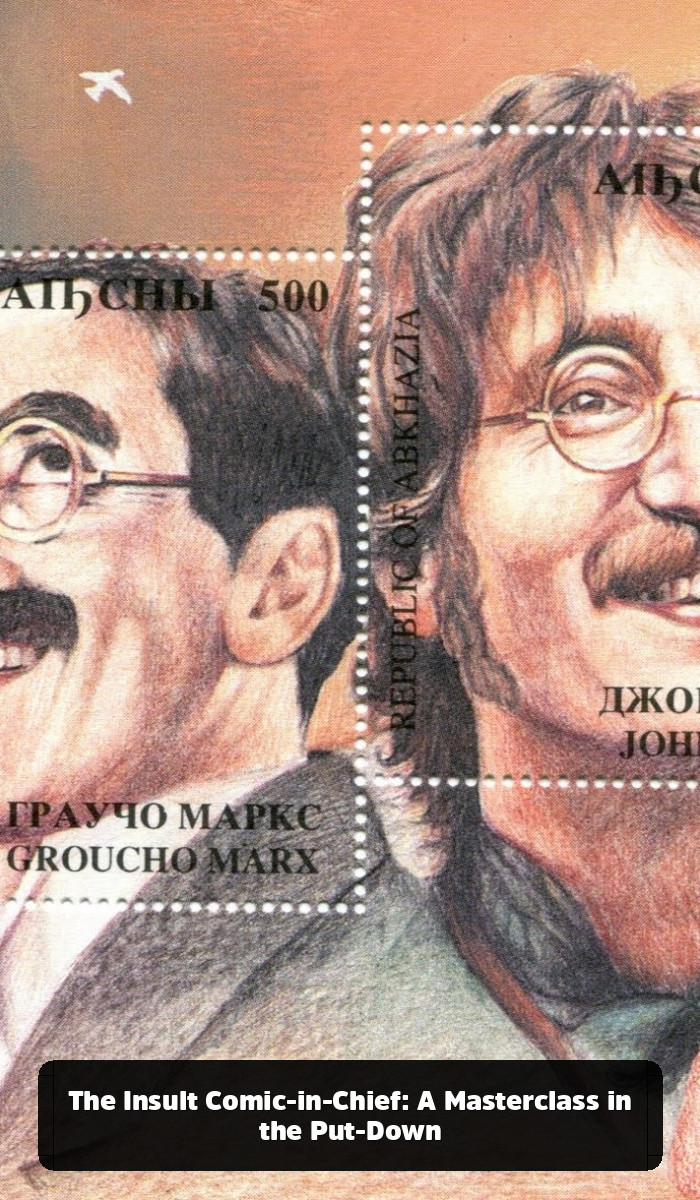
Long before the era of insult comics and celebrity roasts, Groucho Marx was perfecting the art of the witty put-down. His insults were rarely just mean; they were clever, surreal, and often delivered with a playful glint in his eye. They were linguistic puzzles that left his targets both insulted and impressed. The sayings of Groucho Marx are a veritable encyclopedia of how to be devastatingly funny.
“I never forget a face, but in your case I’ll be glad to make an exception.”
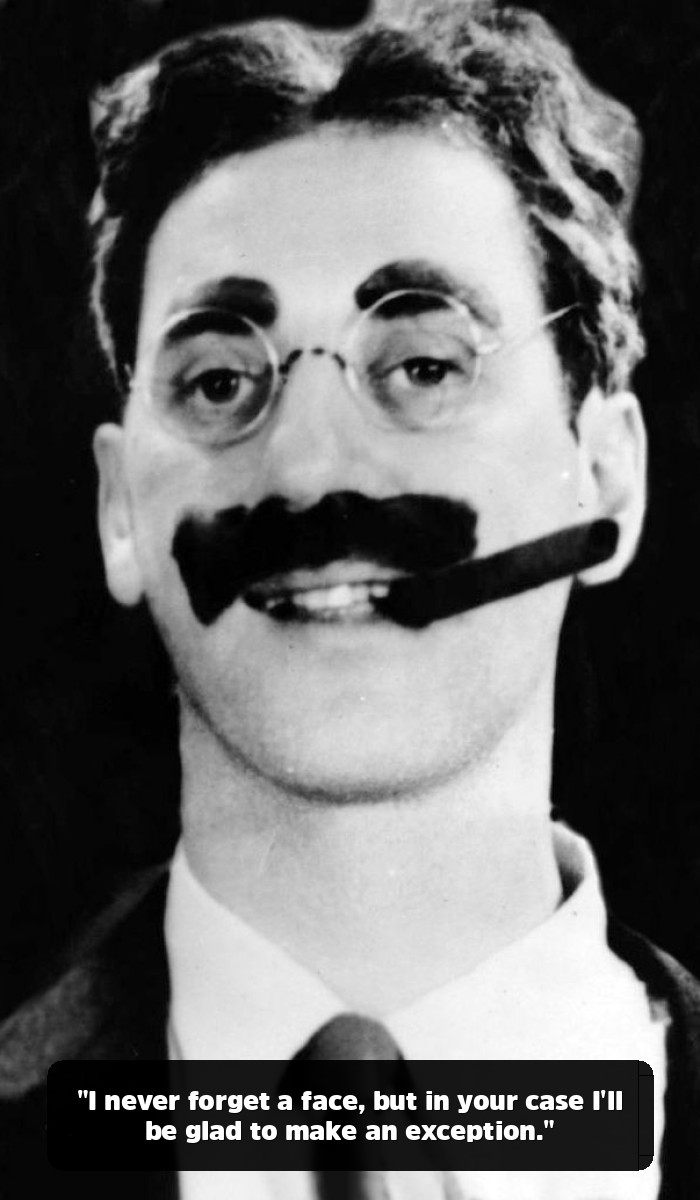
This is the gold standard of backhanded compliments. Like so many of his best lines, it starts out sounding perfectly pleasant. “I never forget a face” is a statement that implies the speaker is attentive and values the people they meet. It sets the target up to feel recognized. Then, the second half of the sentence arrives like a swinging door, knocking them flat.
The genius is in the polite phrasing. “I’ll be glad to make an exception” sounds like he’s doing you a favor. The insult is delivered with the language of cheerful accommodation. It’s this contrast between the polite form and the brutal content that makes it so hilarious and so distinctly Groucho. Many Groucho Marx quotes follow this successful comedic formula.
“He may look like an idiot and talk like an idiot but don’t let that fool you. He really is an idiot.”
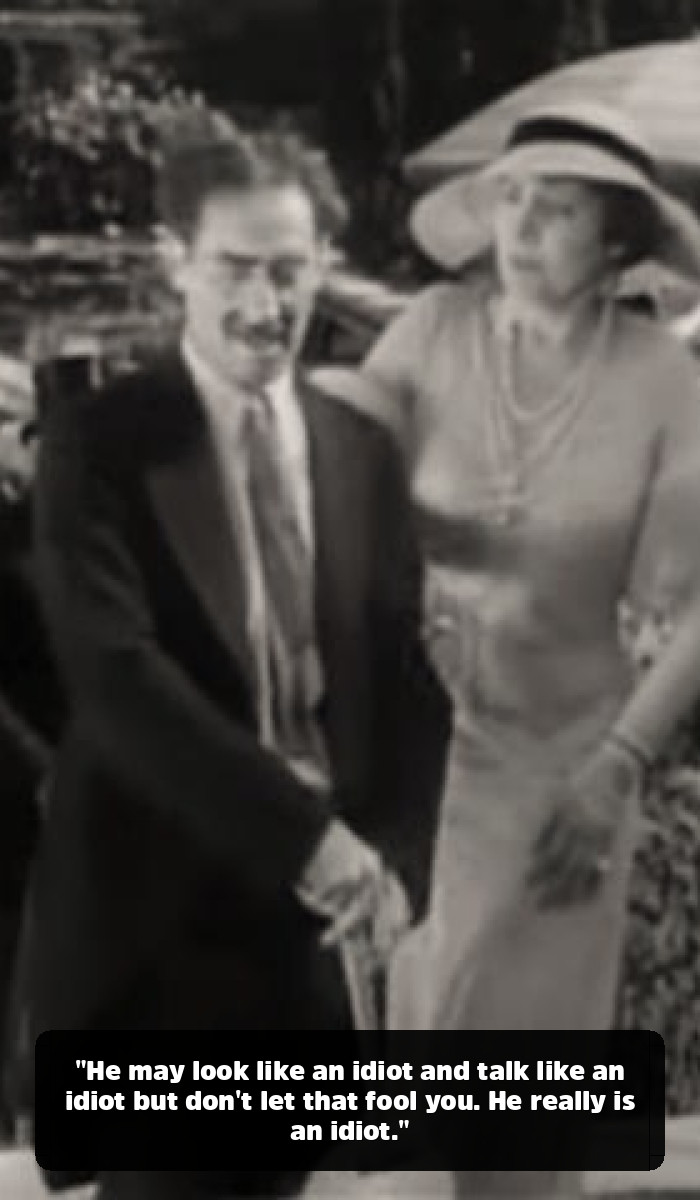
This quote is a wonderful piece of misdirection. It’s a parody of the old saying, “He may look like an X, but he’s really a Y.” We are conditioned to expect a reversal. We hear the first part and fully anticipate the conclusion to be something like, “…but he’s actually a genius.”
Groucho sets up this expectation and then gleefully subverts it. The punchline is not a reversal, but a confirmation of the initial premise. The elaborate setup, designed to defend the person, ends up being the final nail in their coffin. It’s a joke that plays with our expectations and then rewards us with the simple, brutal truth.
“From the moment I picked up your book until I put it down, I was convulsed with laughter. Some day I intend reading it.”
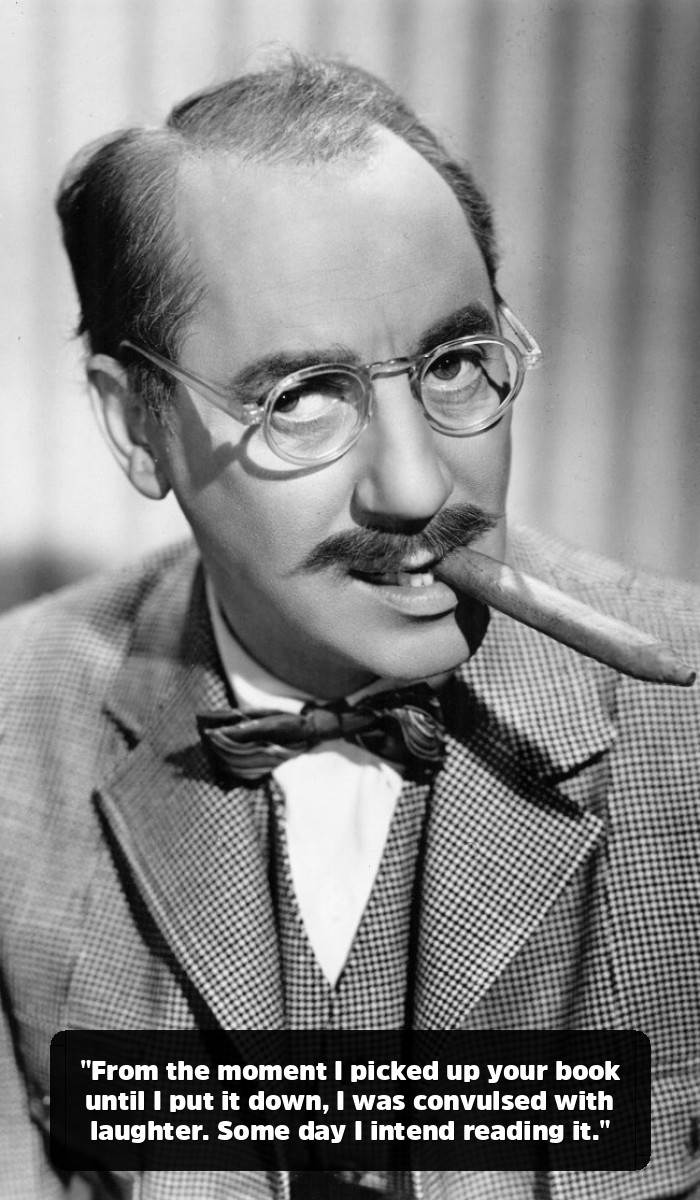
This is an insult so beautifully constructed it almost feels like a compliment. It was Groucho’s legendary response to an author who had sent him a copy of his book. The first sentence is pure, unadulterated praise. “Convulsed with laughter” is the kind of review any writer would dream of.
The second sentence, of course, reveals that the book itself had absolutely nothing to do with the laughter. He hasn’t even read it. The joke brilliantly separates the physical object of the book from its contents. It’s a surreal and hilarious way of saying, “I have no opinion on your work, and I have no intention of forming one.” It is perhaps the wittiest and most polite brush-off in literary history, and a treasured gem among the vast collection of Groucho Marx quotes.
The Man Who Shot an Elephant in His Pajamas: A Deep Dive into the Best Groucho Marx Quotes





